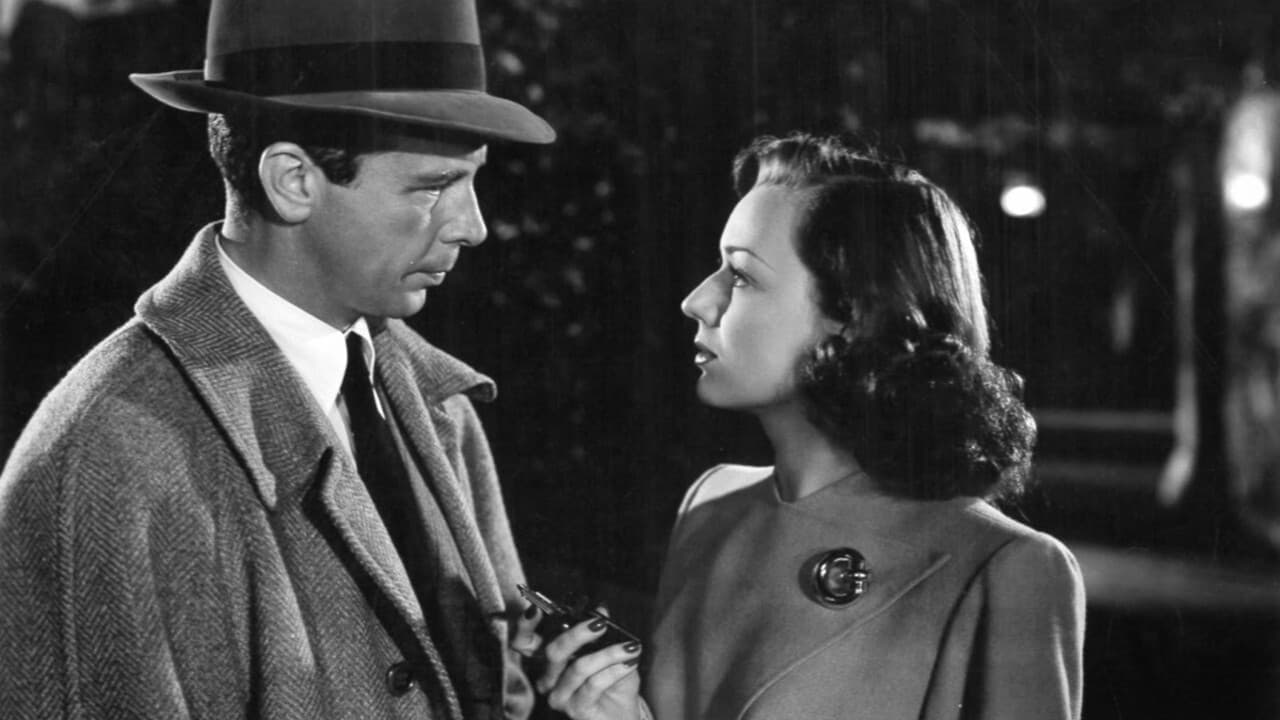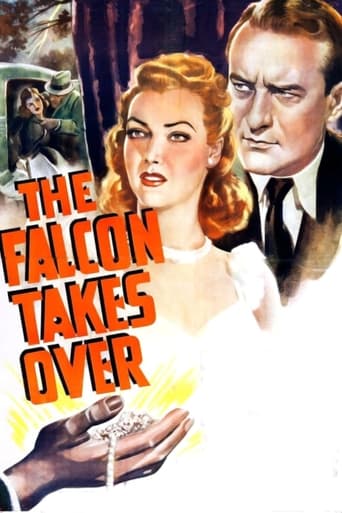

I cannot think of one single thing that I would change about this film. The acting is incomparable, the directing deft, and the writing poignantly brilliant.
... View MoreThis is a coming of age storyline that you've seen in one form or another for decades. It takes a truly unique voice to make yet another one worth watching.
... View MoreThe movie turns out to be a little better than the average. Starting from a romantic formula often seen in the cinema, it ends in the most predictable (and somewhat bland) way.
... View MoreIt is interesting even when nothing much happens, which is for most of its 3-hour running time. Read full review
... View MoreThe character of the Falcon, an amateur gentleman detective similar to Leslie Charteris' "the Saint", was created by Michael Arlen, a Bulgarian-born British writer of Armenian descent, and was then taken up by Hollywood in a series of crime dramas. Arlen's hero was named Gay Falcon, but in the films he was, for unknown reasons, renamed Gay Lawrence, "the Falcon" being a nickname. (Arlen's choice of a forename for his hero was a strange one. I am well aware that in the thirties and forties the word "gay" did not carry its modern meaning of "homosexual", but even then "Gay" was well-established as a feminine Christian name). In the first four films the Falcon was played by George Sanders, who had also played the Saint in a series of films based on Charteris' books. Feeling that he was becoming typecast, Sanders dropped out of the series after the fourth film in which a new Falcon was introduced, Gay Lawrence's brother Tom. This character was played by Sanders' real-life brother, Tom Conway. (His real name was Tom Sanders; "Conway" was a stage name).Arlen, in fact, only wrote one "Falcon" story, which formed the basis for the first film, "The Gay Falcon"; for all the others a new plot had to be found. "New", however, did not always mean "original", and for the third instalment in the series, "The Falcon Takes Over" (aka "The Falcon Steps Out"), the producers borrowed the plot of Raymond Chandler's novel "Farewell, My Lovely", also to be filmed as "Murder, My Sweet" two years later. (A third adaptation of the book, under its original title, was made in the seventies). They moved the action from Los Angeles to New York and substituted the Falcon for Chandler's hero Philip Marlowe.I won't go into the plot in any detail; as one might expect with Chandler it is extremely complex. It revolves around Moose Malloy, a thuggish former wrestler who has escaped from prison and is looking for his old girlfriend. Besides Moose and the Falcon, other characters include an attractive lady reporter, a wealthy heiress and the Falcon's assistant Jonathan 'Goldie' Locke, who plays Watson to his Holmes. Locke is a wisecracking New Yorker with a strong Brooklyn accent; the idea was presumably to provide a contrast with the Falcon himself, who is played as an upper-class English gentleman.The film was made as a B-movie, which meant that it had a very short running time of only just over an hour. This was really insufficient to deal with all the complexities of Chandler's plot and as a result the film comes across as very rushed, muddled and difficult to follow. That is not always a problem with forties crime dramas; nobody, for example, would claim that the plot of Howard Hawks' "The Big Sleep", also based on a Marlowe story, is easy to understand, yet it is still a great movie. Director Irving Reis, however, is unable to capture that powerful sense of atmosphere which is so important a quality of Hawks' film.I have often admired Sanders as an actor, but normally in better films than this one. He often seemed to be at his best in supporting roles rather than as the main star, for example in "Rebecca", "Samson and Delilah", "Foreign Correspondent", "Ivanhoe" and "All about Eve", for which he won a "Best Supporting Actor" Oscar. (Indeed, in a number of these films, notably "Samson" and "Foreign Correspondent", he actually gave a better performance than did the film's official main star). Here, however, he is the lead, and hardly makes the most of it, seeming far too relaxed and laid-back. This may be in line with the Falcon's character, but in real life even the most insouciant individuals tend to become more serious when grave matters like murder are at stake. Allen Jenkins as Goldie starts off as amusing but his appeal wears off after a while.Reis was clearly attempting the film noir style which was becoming very fashionable in 1942, but noir seems to have needed the greater budget and running-time of an A-movie to succeed. Many noirs from the period remain marvellously watchable today, but "The Falcon Takes Over" is not amongst them. 4/10
... View MoreWhile out at a local club, Gay Lawrence finds himself close by when a man called Moose Malloy comes into the club looking for his Velma, killing the manager in the process of asking. The police pick up on the case but Gay starts searching for Velma. He picks up a lead that involves a meeting, before getting a call out of the blue from a man looking for help. When the 'case' turns out to be a trap designed to kill Gay, he finds himself in the middle of something bigger than he expected.I'm not sure why, after so many films, the Falcon series suddenly reached into Raymond Chandler for its source material. Perhaps it was the fact that Sanders was fed up doing the films and maybe they were trying to provide of a film for him to work with. Certainly this is a rather different entry in the series that manages to change some elements of the series while also keeping aspects that make it a Falcon film however this is a weakness rather than a plus point because the two aspects detract from one another. Being the first filmed version of Farewell, My Lovely, this film gets off to a good start; in fact I was surprised to see Moose Malloy looking for Velma and I started to think maybe it was spoofing the film, until I realized that this was made a couple of years before the most famous version. The plot is dark and mysterious and is better delivered as noir something that the Falcon film cannot do whilst trying to remain a Falcon film. So although the plot follows the source material well, it never really gets a tone that it deserves.The reason for this is that the material is mixed with the usual Falcon brand of humours and characters. Elements such as Goldy's quips and the discussions between O'Hara and his detective are funny but they don't fit well. Of course this hurts the Chandler material more than it hurts the Falcon series because the addition of a good plot helps add to the usual Falcon aspects so it turns out to be a good Falcon film but a very average version of the Chandler story. The cast don't really help either, some failing on their own terms while others show their shortcomings when compared to different actors playing the same roles in other versions. Sanders was one film away from leaving the series as with his suicide, when he had had his fill of things he simply stepped out without fuss. In his performance here you can see that his heart is not in it anymore - he makes little effort with the material given him although it is not all his fault; he couldn't be expected to suddenly turn the Falcon into the complex, downbeat hero of Chandler's story. Jenkins does his usual stuff pretty well but I think he knew that he was an add-on to the story and he tried hard to compensate. Gleason is pretty funny in a minor role but the story specific characters are not as well played as they would later be. Bond may well have been a good model for later versions but he is not as good as them. He tries hard and has a good presence but I just found it hard to accept him as the character. The actresses in the roles of Velma and Riordan are all OK, but nothing more than that. Overall this is an OK Falcon film despite the weaknesses. The plot is better than normal but not as well used as the same source would be in other films later on. The Falcon humour and character take away from the core of the story and stop it being the noir it deserves to be, while the mix of material and series formula is not totally successful not quite oil/water but certainly strange bedfellows. Fans of the Falcon and Chandler completists will seek it out but for most people it will just be an average crime film or a poor version of a story done better elsewhere.
... View MoreThis entry in an otherwise it-is-what-it-is series of crime programmers merits attention because it preserves the first filming of a novel by Raymond Chandler: Farewell, My Lovely two years before Edward Dmytryk's Murder, My Sweet, one of that handful of 1944 films that really got the noir cycle rolling.Often such adaptations bear scant resemblance to their original material, bringing to mind the screenplay Joe Gillis (in Sunset Blvd.) wrote that started out with Okies in the Dustbowl and ended up on a torpedo boat. But The Falcon Takes Over startlingly opens with a character called Moose Malloy (Ward Bond) looking for his Velma (Helen Gilbert can't even begin to pinch-hit for Claire Trevor). Along the way we visit that drunken old streel Jessie Florian (Anne Revere, every bit as good as Esther Howard) and Jules Amthor (Turhan Bey, complete with turban and crystal ball).Given the quality of much of the cast and the initial fidelity to Chandler's material, the movie promises to be much better than it turns out. And what sinks it is the notion that Chandler could supply fodder for a `programmer.' First of all, 90 or 100 minutes offer too brief a span for his baroque tales to unfurl; an hour plus change mutilates them irreparably. Second, franchises like Charlie Chan, or The Saint, or The Falcon are struck from the same template, to which all material must conform. So the setting is not the languorous corruption of Los Angeles but the hurly-burly of New York; missing as well is any sense of Chandler's awareness of the advantages conferred by wealth and class.But most conspicuous in his absence, of course, is Philip Marlowe. He disappears into George Sander's last run as The Falcon, before he bequeathed the franchise to his brother Tom Conway. (Sanders walks through this picture as if he had given up on the last one.) He has a sidekick, too (Allen Jenkins), who's chock-full of amusing malapropisms. Sidekicks and malapropisms are about as far from Chandler's dark universe as it's possible to go.
... View MoreAn entertaining enough film, but a bit too "cute" and tries a bit too hard to be funny for hard-core film-noir fans like myself. For a far superior adaptation of the same Chandler story, I highly recommend "Farewell My Lovely" (1975).
... View More